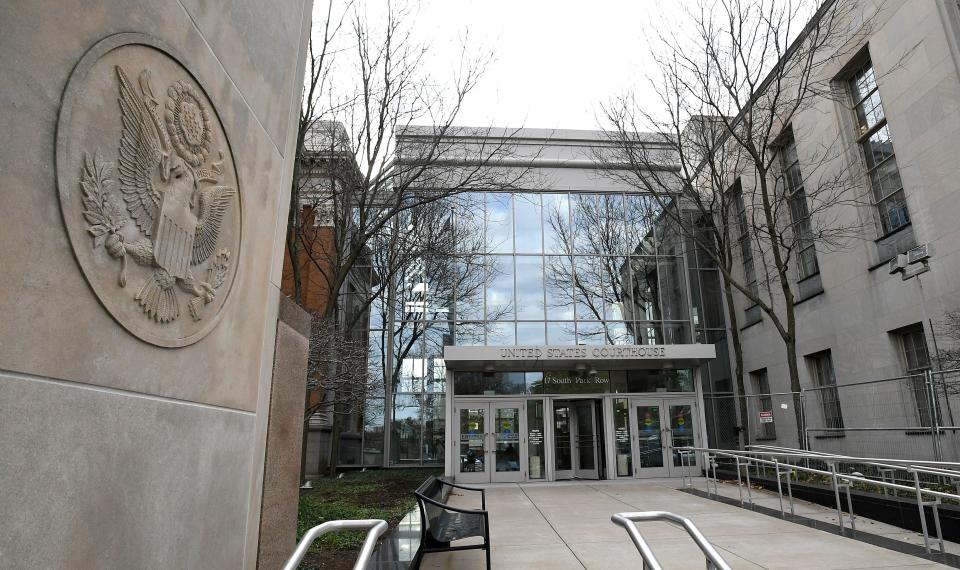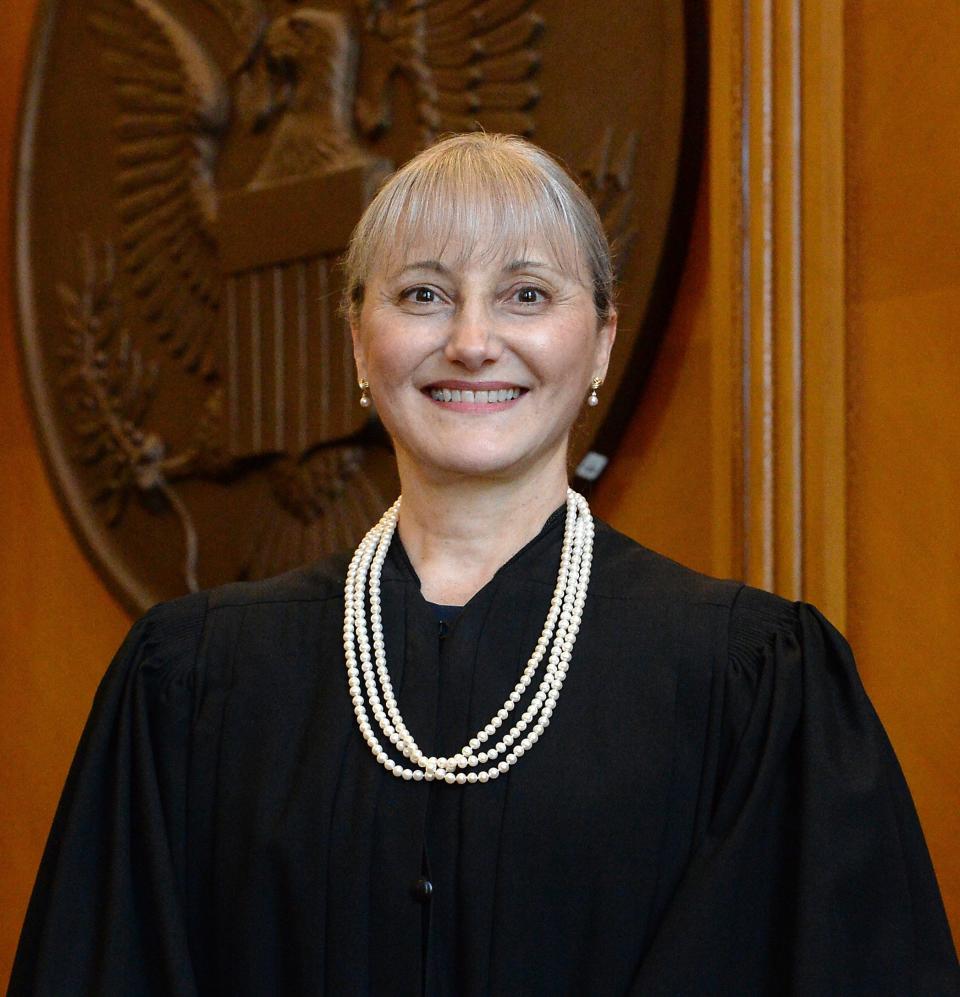'Everyone turned a blind eye': Feds unveil 'smoking-gun' evidence in Hertel & Brown case
Without providing details, two of the defendants in the Hertel & Brown federal criminal case have said in court records that the U.S. Attorney's Office considers the statements they gave to the FBI to be "confessions" and "smoking-gun" evidence of widespread billing fraud at the Erie-based physical therapy business.
Newly filed court records show why the U.S. Attorney's Office came to that conclusion.
The two defendants, both physical therapists, told FBI agents that they and other employees at Hertel & Brown Physical & Aquatic Therapy regularly overbilled for services at the direction of the business' owners, according to a federal prosecutor's summaries of the statements contained in the newly filed records.
The defendants, according to the summaries, said they and other employees billed for physical therapy treatments as if they were performed by physical therapists even though physical therapy assistants or physical therapy technicians actually treated the patients. The billing rate is higher for physical therapists than for assistants or technicians.
The defendants, according to the summaries, also said physical therapists at Hertel & Brown were told not to bill group therapy sessions as group therapy but as individual therapy sessions, which led to higher billing rates.

The defendants said the co-founders and owners of the business, Aaron W. Hertel and Michael R. Brown, told the employees how to bill for services in the improper manner, according to the summaries. One of the two defendants, Julie Ann Johnson, also told the FBI agent "that at Hertel & Brown that is the way it has always been done and we turned a blind eye," Assistant U.S. Attorney Christian Trabold said in the court records.
Trabold also said that "Johnson indicated that money was the reason the owners wanted physical therapy to be billed as individual therapy. When asked if this was due to greed, Johnson said, 'yes.'"
Johnson, according to Trabold's summary, told the FBI that "during one of her recent work performance evaluations, Aaron Hertel told her that Hertel & Brown was losing money. Michael Brown said that insurance reimbursements were going down and that the company still has to pay for all its therapists. Therapists were instructed to bill individual sessions and have the technicians do the ... therapeutic exercises."
"Johnson advised that she didn't leave Hertel & Brown even though she knew that this billing practice was going on because everyone turned a blind eye to the billing practices at Hertel & Brown," according to the summary.
The other defendant who gave statements to the FBI is Jacqueline Renee Exley, according to the summaries. Trabold said in court records that she also said Hertel & Brown's billing practices regarding technicians and group therapy were longstanding. She said Hertel & Brown needed to have technicians treat patients to keep up with the practice's patients, according to the summaries.
Trabold said Exley stated to the FBI that "Hertel & Brown sees too many patients and does not have enough physical therapists on staff to treat them all. She further revealed that the only way they could treat the high number of patients seen every day was to have technicians perform a physical therapist's job, such as placing electronic stimulation (e-stim) on patients and administering treatment.
"Exley heard Michael Brown say that placing e-stim on a patient is 'stretching it' legally, but they were going to continue to do it anyway.
"Exley further disclosed that Michael Brown knew it was wrong but chose to continue the practice of having technicians administer e-stim treatment and then bill for that treatment as if a physical therapist had performed it. Exley stated that she also knew it was wrong and illegal, but she went along with it because she needed a job."
Exley also stated, according to Trabold's summary, "that Michael Brown and Aaron Hertel are the owners, and the employees follow their rules since they are their bosses."
Defense lawyers seek to suppress statements in Hertel & Brown case
Johnson and Exley are among the 21 defendants indicted in the Hertel & Brown case in U.S. District Court in Erie on Nov. 9, 2021. The two spoke to FBI agents when the agents searched Hertel & Brown's offices on Feb. 23, 2021, to gather evidence against the business, according to court records. The interviews were not recorded.
Johnson and Exley and their Pittsburgh-based lawyers have disputed the statements for months. In a court motion filed in January, the lawyers contended that Johnson and Exley did not make the admissions that the FBI agents said they did.
The lawyers — Jennifer Bouriat for Exley and Efrem Grail and Julia Gitelman for Johnson — said in a joint motion that the U.S. Attorney's Office told them the statements contained in the FBI reports are "confessions" and "smoking-gun" evidence, but that Trabold refused to turn over the FBI's raw notes of the interviews, citing what the government believes is longstanding precedent.

Trabold responded later in January by releasing the raw notes to Exley and Johnson and their lawyers. The notes, according to the U.S. Attorney's Office, support the FBI's summaries of the interviews, called 302 reports.
"The notes are consistent with the reports drafted by the agents and provided to defense counsel," Trabold said in the filing in January.
The defendants' contention that the FBI misrepresented what they said in the interviews "is pure speculation on the part of the Defendants without any basis in fact," Trabold said, "especially since the agents' notes already provided to the defense demonstrate that the notes and reports are not inconsistent."
The dispute did not end there.
In May, the lawyers for Exley and Johnson filed motions seeking to suppress their clients' statements to the FBI. The lawyers claimed the agents, among other things, failed to read Exley and Johnson their Miranda rights, including their right to remain silent.
The lawyers in their suppression motions never detailed what the FBI said Exley and Johnson told the FBI in their interviews.
That information was unveiled on Monday. Trabold summarized the interviews in two documents he filed in response to the suppression motions.
Trabold is arguing that the FBI acted properly, and that Exley and Johnson, among other things, were not under arrest when they gave the statements — a circumstance he said did not require the reading of the Miranda rights.
U.S. District Judge Susan Paradise Baxter is assigned the Hertel & Brown case and will rule on the suppression requests. Baxter on Tuesday evening scheduled a hearing on the requests for Aug. 23, though Bouriat, Exley's lawyer, asked that the hearing be moved to a later date.
All Hertel & Brown defendants have pleaded not guilty
The number and names of other defendants who gave statements to the FBI have not been disclosed in court records in the Hertel & Brown case.
Trabold said in a filing in February that Aaron Hertel invoked his Fifth Amendment right to remain silent and did not talk to investigators. Trabold said in one of Monday's filings that Michael Brown "refused" to talk to investigators when the FBI searched Hertel & Brown's offices in February 2021.

And in court in March 2022 — four months after the indictment — Trabold said that a number of defendants were cooperating and were ready to testify at trial. His statement signaled that plea deals were in the works, though none of the defendants has pleaded guilty to date.
The plea talks, if they occur, are not expected to intensify until after Baxter rules on whether to suppress evidence in the Hertel & Brown case. Many of the other defense lawyers in the case are still determining whether they will file suppression motions, according to court records.
The 21 defendants in the Hertel & Brown case — the largest-ever white-collar criminal prosecution in U.S. District Court in Erie — are accused of conspiring in an overbilling scheme to defraud Medicare, Medicaid and private insurers of $22 million over 14 years, starting shortly after Hertel & Brown launched in January 2007 and ending in October 2021. The indictment charges all the defendants with one count each of the felonies of health care fraud and criminal conspiracy to commit wire fraud and health care fraud.
The practice's founders, Hertel, 44, and Brown, 46, are the lead individual defendants. Hertel & Brown is named as a corporate defendant.
All the defendants in the Hertel & Brown case have pleaded not guilty and are free on unsecured bonds. Of the 20 individual defendants, 19 are either licensed physical therapists, such as Jacqueline Exley and Julie Johnson, or licensed physical therapy assistants, according to the indictment. A billing specialist at Hertel & Brown was also indicted.
Hertel & Brown remains in business, but is down to one office from five.
'Nothing changed' about billing practices, according to statement
In the new filings, Trabold, the prosecutor, said Exley's interview with the FBI on Feb. 23, 2021, lasted no more than 30 minutes. Johnson's lasted about 90 minutes, Trabold said.
He said in the filings that the interviews were professional and not hostile, and that Johnson and Exley were told they were free to leave at any time.
During the interviews, Trabold also said in the filings, Exley and Johnson told the FBI that Aaron Hertel and Michael Brown did not change their billing practices at Hertel & Brown despite the staff and others raising questions about them.
According to Trabold's summary, Johnson told the FBI "that all the physical therapists brought up concerns with Michael Brown and Aaron Hertel about billing group sessions as individual therapy sessions. Johnson also revealed that nothing changed."
Johnson, Trabold said in the summary, "advised that no employees were let go or fired as a result of concerns about billing practices, and no one was verbally threatened to lose their jobs if they did not bill group therapy sessions as individual sessions."
Contact Ed Palattella at epalattella@timesnews.com. Follow him on Twitter @ETNpalattella.
This article originally appeared on Erie Times-News: Hertel & Brown billing fraud case: 'Smoking-gun' evidence unveiled

